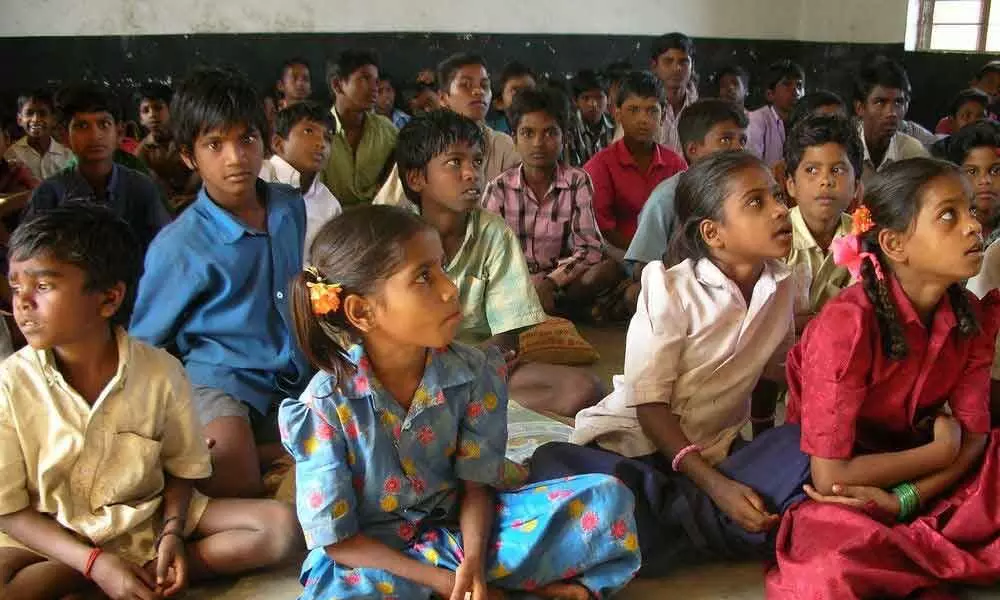Education reforms vital for economic growth

Education reforms vital for economic growth
Our educational system is the major bottleneck in securing double digit economic growth which is obtained when our people get employment and are productive.
Our educational system is the major bottleneck in securing double digit economic growth which is obtained when our people get employment and are productive. But jobs are shrinking due to the competition from machines and computers. We will have to improve our educational system so that man can compete with these machines. The government education system, however, produces certificates rather than skills or knowledge. It is necessary to reform it since it caters to a large section of the society. The teachers of the government schools have little incentive in teaching since their jobs are secure irrespective of whether they teach or not. The AAP government has reformed the government education system in Delhi majorly. Yet, the pass percentage in high school of government schools was 72 per cent against 93 per cent for private schools. The situation of government schools in other States is much worse. I will discuss the example of Uttar Pradesh and Bihar in this article although the situation is similar across the country.
The UP government was spending Rs 25,000 per student on the primary and the secondary education in 2016-17. This may be about Rs 30,000 in the current year 2021-22. It is reported that the government schools are showing a number of fake admissions to get the free meals, uniforms and other freebies. In one study, 4.3 lakh fake admissions were detected in 9 districts of Bihar. Estimates for fake students are not available but let us assume 20 per cent for the present. The government expenditure per real student would be Rs 37,000 per real student if the fake students are not counted. This amount is being spent only on the students studying in the government schools. About 64 per cent children were studying in government school in 2014, according to a survey done by the National Sample Survey Organization (NSSO). I estimate that about 55 per cent may be studying in government schools today because parents want to send their students to private schools as their income rises. Thus, the UP government is spending about Rs 20,000 per student counting all studying in a private or a government school.
One-half of this amount can be distributed to all the students of the State. Each student can be given Rs 10,000 per year in form of an education voucher out of the money already being spent by the UP government. This money can be obtained by reducing the salaries of the government teachers. About 90 per cent of the expenditure in government schools goes to pay the salaries of teachers. The teachers of the government primary schools often draw a salary of Rs 50,000 per month or more against Rs 5,000 to Rs 10,000 drawn by a teacher in a private school. A 50 per cent reduction can be made in the salaries of the government teachers. They would still be drawing salaries at least double of their counterparts teaching in the private schools. This amount can be used to fund the education vouchers. The students would be able to pay a fee of Rs 800 per month in a school of their choice—whether government or private.
A survey got done by the NSSO found that the average fees in a private primary school was Rs 417 per month in 2014. This may be about Rs 700 today. This amount can be paid by the voucher. In this system, it will become necessary that government schools attract students in competition with the private schools. The government teachers will be able to recoup their reduced salaries if they are able to attract students and collect their vouchers. The government schools will be forced to improve their quality of education in order to get their present salaries. Private schools will also benefit because they would be able collect part of the fees from the vouchers, increase the total fees collected and invest the money in providing better education.
Studies across the world have given details of the benefits from the implementation of the voucher system. Improvement was seen in the results of students who shifted from the government to the private schools in the District of Columbia in the United States on the strength of the vouchers. The quality of education in government schools improved in New Zealand because they wanted to collect more vouchers. The voucher system was implemented as an experiment in Andhra Pradesh in our country. It was found that the results of student obtaining education through the voucher system obtained better results in English and Mathematics. The results in Delhi were better in English but no improvement was observed in Hindi and mathematics.
Girls were seen to benefit especially from the voucher system. This may be due to the parents sending them to government schools without the vouchers and to private schools with the vouchers. These and many other studies show that the voucher system leads to an improvement in the quality of education. The negative effect of the voucher system is mainly seen in the increase of inequality. It was found in Belgium, New Zealand, Sweden, United States and other countries that the students from poorer households are further left behind and the richer sections march ahead by paying addition fees in addition to the fees paid by the vouchers. However, there is a fundamental difference in the condition of these countries and ours.
The students are compulsorily required to take admission in the government school in his or her area in the United States and some other countries if he or she opts to go to a government school. Such is not the case in India. An article in the reputed Journal of Economic Literature has reported no adverse impact of vouchers in Andhra Pradesh. Perhaps, this is because the richer students may migrate from a middle- to a high-quality private school making a small difference while the poor student my migrate from a low- to a middle quality private school, making a huge difference.
Another negative aspect of private schools in some countries is that they allow, even encourage, their students to copy and pass the exams. This argument does not apply in our country because the board exams are conducted under the same arrangement for students from private and government schools. We must urgently implement a voucher system to place our economy on a high growth path.
(The author is former Professor of Economics at IIM, Bengaluru)
(The opinions expressed in this column are those of the writer. The facts and opinions expressed here do not reflect the views of The Hans India)














